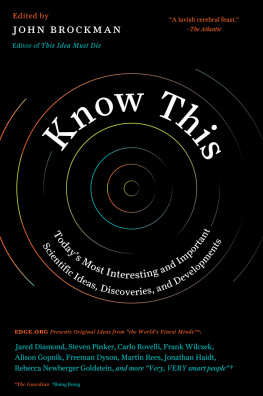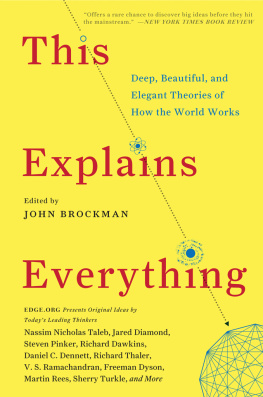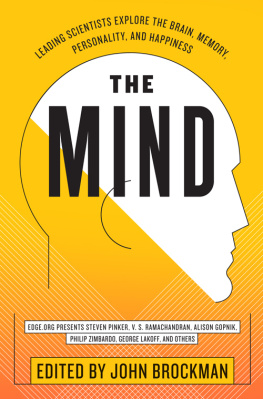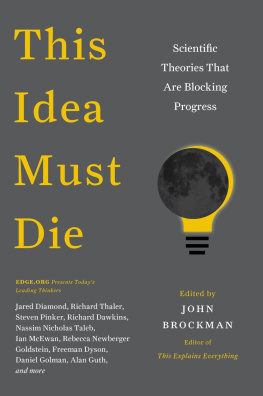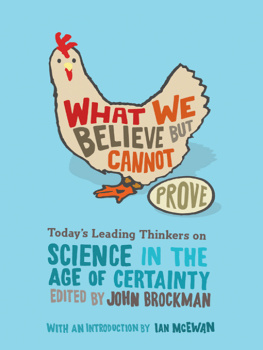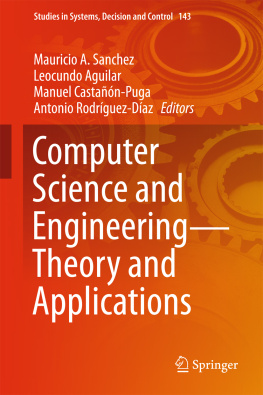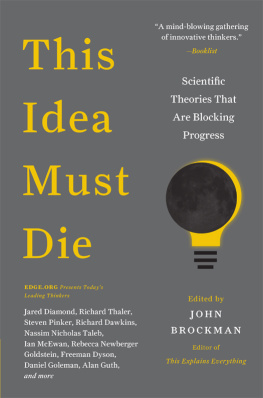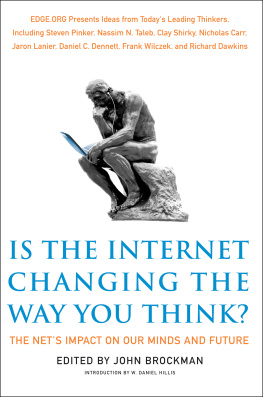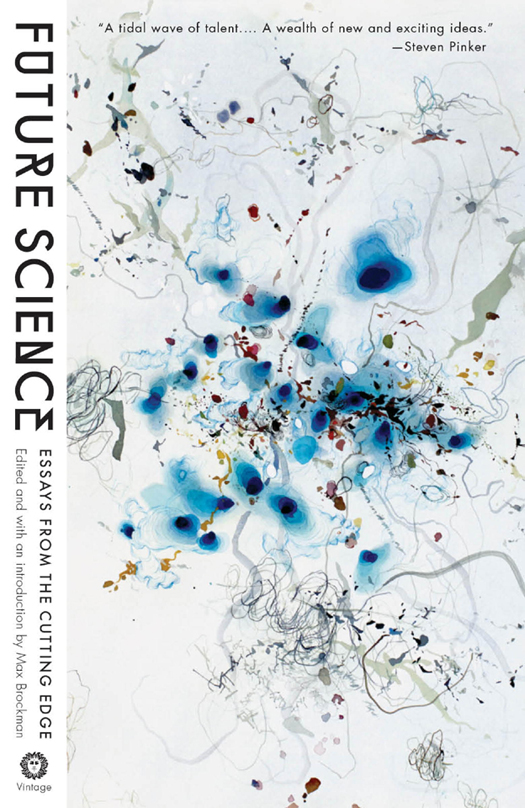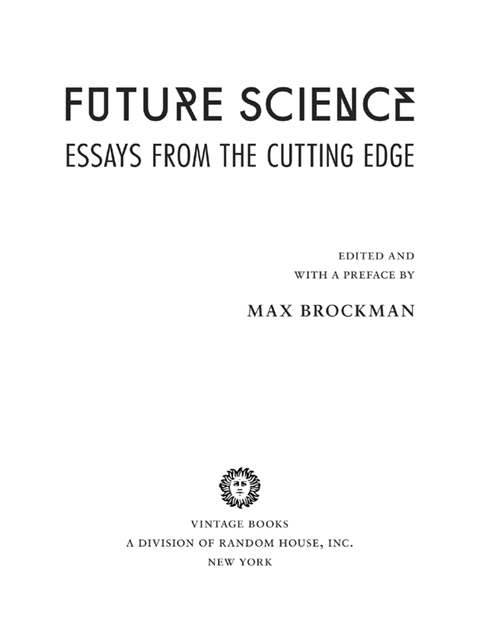Max Brockman is the vice president of Brockman, Inc., a literary agency, and the editor of Whats Next? Dispatches on the Future of Science. He also works with the Edge Foundation, Inc., a nonprofit organization that publishes the Edge newsletter (www.edge.org). He lives in New York City.
All rights reserved. Published in the United States by Vintage Books, a division of Random House, Inc., New York, and in Canada by Random House of Canada Limited, Toronto.
Vintage and colophon are registered trademarks of Random House, Inc.
CONTENTS
Max Brockman:
Preface
What makes ocean worlds like Jupiters moon Europa compelling places for astrobiology? Despite considerable evidence to the contrary, Earth was not a particularly good place for life to arise. The main ingredients for life as we know it are a lot easier to find farther out in the Solar System.
Several novel empirical findings suggest that human altruism has deeper roots than previously thought.
A combination of cheap DNA synthesis, freely accessible databases, and our ever-expanding knowledge of protein science is conspiring to permit a revolution in creating powerful molecular tools.
Infinity can violate our human intuition, which is based on finite systems, and create perplexing philosophical problems.
Why is it that when faced with the same challenges, some of us crumble, some of us survive, and some of us even thrive?
Vast digital trails of social interaction allow us to begin investigating questions that have been the subject of theoretical inquiry and small-scale analysis for a century or more.
My quest to understand the natural origins of attractiveness preferences led me to the African savanna near Lake Eyasi in Tanzania.
Why do house sellers, professional golfers, experienced investors, and the rest of us succumb to strategies that make us systematically go wrong?
The goal of the new field of decision neuroscience is a greatly improved understanding of the variability that dominates our moment-to-moment decision-making behavior.
Balancing group and self-interest has never been easy, yet human societies display a high level of cooperation. To attain that level, specialized traits had to evolve, including such emotions as shame.
To what degree plant populations can adapt to novel disease pressures in an altered and increasingly unpredictable climate remains largely unknown.
The basic patterns of neocortical anatomy that produce a set of fixed neural rhythms are conserved throughout the mammalian lineage, and they predate the elaboration of vocal repertoires.
The experience of social pain, while temporarily distressing and hurtful, is an evolutionary adaptation that promotes social bonding and, ultimately, survival.
Peoples intuitions about whether a given entity has a mind do not appear to be based entirely on a scientific attempt to explain that entitys behavior.
How will advances in the science of moral judgment change the way we think about the law?
Recent work suggests that our moral judgment of another person depends on specific brain regions for reasoning about that other persons mental state.
Cross-culturally, the human mind varies more than we generally assume.
Culture-gene coevolutionary theory describes a complementary process by which adaptive mechanisms in the human mind and brain evolved to facilitate social group living through both cultural and genetic selection.
PREFACE
Academia, with its somewhat old-fashioned structure and rules, can appear quite a strange place when observed from the outside. Frequently, through my work as a literary agent, Ive noticed that if youre an academic who writes about your work for a general audience, youre thought by some of your colleagues to be wasting your time and perhaps endangering your academic career. For younger scientists (i.e., those without tenure), this is almost universally true.
There are some good reasons for this peer pressure, the most obvious being that getting published in academic journals is an essential step on the very difficult road to tenure. However, one unfortunate result is that those of us outside academia are blocked from looking in on the research being done by this next generation of scientists, some of whom will go on to become leading doers and communicators of science.
This opacity was the impetus for the first essay collection in this series, Whats Next?: Dispatches on the Future of Science. Essays seemed to be an ideal and appropriate way for representatives of this group of scientists to communicate their ideas. The title of the new collection is different, but the organization is the same. Future Science features essays from nineteen young scientists from a variety of fields, writing about what theyre working on and what excites them the most. To come up with the list of contributors, I fielded recommendations from top scientists on the rising stars in their various disciplines.
Among those you will hear from in Future Science are:
- Kevin P. Hand, a planetary scientist and astrobiologist at the Jet Propulsion Laboratory in Pasadena, California, on the possibilities for life elsewhere in the solar system (and the universe)
- Felix Warneken, who heads the Social Cognitive Development Group at Harvards Laboratory for Developmental Studies, on investigating the evolutionary roots of human altruism in his studies of young children and Ugandan chimpanzees
- William McEwan, a virologist and postdoctoral researcher at the MRC Laboratory of Molecular Biology, Cambridge, U.K., who probes the biology of antiviral immunity by designing his own viruses
- Anthony Aguirre, a physicist and cosmologist at the University of California, Santa Cruz, who maintains that infinity has been brought into the domain of testable physical science
- Daniela Kaufer and Darlene Francis of the University of California, Berkeley, neurobiologists who have taken a transdisciplinary approach to the study of the effects of stress on mind and body
- Jon Kleinberg, a professor of computer science at Cornell University, who is working on ways to extract significance from the enormous data sets we are building in the Internet age.
Working on Future Science has been an extremely rewarding experience, and I look forward to putting together the next collection in this series. These passionate young scientists, by giving us a glimpse of the work theyre doing today, are in a sense providing a window into the world to come.


